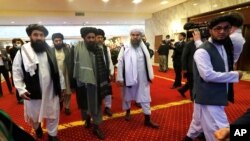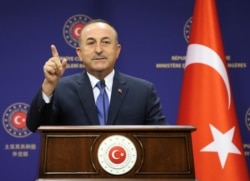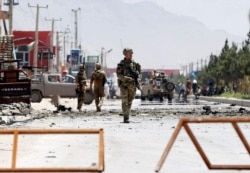The United Nations said Wednesday a multi-nation conference that the organizers had hoped would “add momentum” to the faltering peace talks between Afghanistan’s warring parties has been postponed.
Turkey, Qatar and the U.N. had planned to convene the 10-day event, proposed by the United States, in Istanbul starting this Saturday.
“In view of recent developments, and after extensive consultations with the parties, it has been agreed to postpone the conference to a later date when conditions for making meaningful progress would be more favorable,” the conveners said in a joint statement.
Afghan officials had already said they would send their delegation to the conference. Kabul has not immediately commented on the postponement of the event.
Representatives of the Afghan government and the Taliban were supposed to attend the conference and discuss resumption of stalled peace talks between the two adversaries to reach a power-sharing deal that would end the country’s nearly two-decade long war.
The so-called intra-Afghan negotiations have been deadlocked for most of the time since they began last September in Doha, Qatar.
The talks stemmed from a landmark peace-building agreement Washington sealed with the Taliban in February 2020 to withdraw all U.S. troops from Afghanistan to end what has been America’s longest war.
The U.S.-Taliban deal had required all American and NATO-led troops to leave the country by May 1. But President Joe Biden last week announced that the U.S. would withdraw its remaining between 2,500 and 3,500 troops from Afghanistan by September 11, and not by the deadline originally agreed with the insurgents.
Within hours of Biden’s announcement, the Taliban said they would not participate "in any conference that shall make decisions about Afghanistan” until all foreign forces leave their country.
“The conference would be meaningless without the Taliban joining. At the moment, we decided to postpone it since there is no clarity about the formation of the delegations and participation,” Turkish Foreign Minister Mevlut Cavusoglu told the Habertürk news channel in an interview that aired Tuesday night.
The Turkish foreign minister said diplomatic efforts together with co-conveners and the U.S. will continue to arrange the conference after the Muslim fasting month of Ramadan, which ends in mid-May.
Pakistani Foreign Ministry spokesman Zahid Hafeez Chaudhri said, “We believe that the meeting of Afghan leadership in Turkey, on the new dates once finalized, would be an important opportunity for the Afghans to make progress towards a negotiated political settlement.”
The postponement of the Istanbul conference has dampened hopes of a reduction in the deadly Afghan war that a new study estimated this week has killed about 241,000 people, including Americans, and cost Washington more than $2.4 trillion since the October 2001 U.S.-led invasion of Afghanistan.
“Well, when it comes to the talks in Istanbul, this gets to the point that from the various early — very earliest days of the Biden administration, we have recognized, number one, that there is no military solution to the conflict in Afghanistan,” U.S. State Department spokesman Ned Price told reporters in Washington when asked about the status of the Istanbul meeting.
Price went on to say, “Only through a political settlement and a comprehensive cease-fire will we be able to support a resolution that brings security, stability, and prosperity to the people of Afghanistan.”
Russia, which was among the participating nations, said that in the absence of a “shared agenda, the decision to postpone the Istanbul conference was expected.
“This is predictable, to be honest, because we see that so far, the positions of the Taliban movement and the wider Kabul side, that includes the government, the High Peace Council and separate political figures, do not coincide,” Zamir Kabulov, Moscow’s presidential envoy for Afghanistan, told the TASS news agency.
“In these conditions, without some shared agenda, holding such an event would make no sense, of course," Kabulov was quoted as telling the Russian media outlet.
Analysts say Afghan battlefield hostilities would have continued even if the Turkey-hosted conference had taken place because of the Taliban’s insistence on replacing President Ashraf Ghani’s administration in Kabul with a new “Islamic government.”
Torek Farhadi, a former Afghan government adviser and political commentator, anticipates the Taliban would intensify their military campaign and extend territorial influence in the months leading up to the complete foreign troop withdrawal
"This will likely put the government under pressure. Winning or losing after the U.S. exit will be dictated at the battlefield. Kabul politicians will intensify pressure on Ghani to resign in order to open the door for the participatory government, including the Taliban,” Farhadi added.
President Ghani has refused to relinquish power in favor of a transitional government, as has been proposed by the U.S. to help move the peace process forward.
Ghani says he is ready to hold early elections and neither he nor officials in his current government will run in them in exchange for a peace deal with the Taliban that would establish a comprehensive cease-fire.







